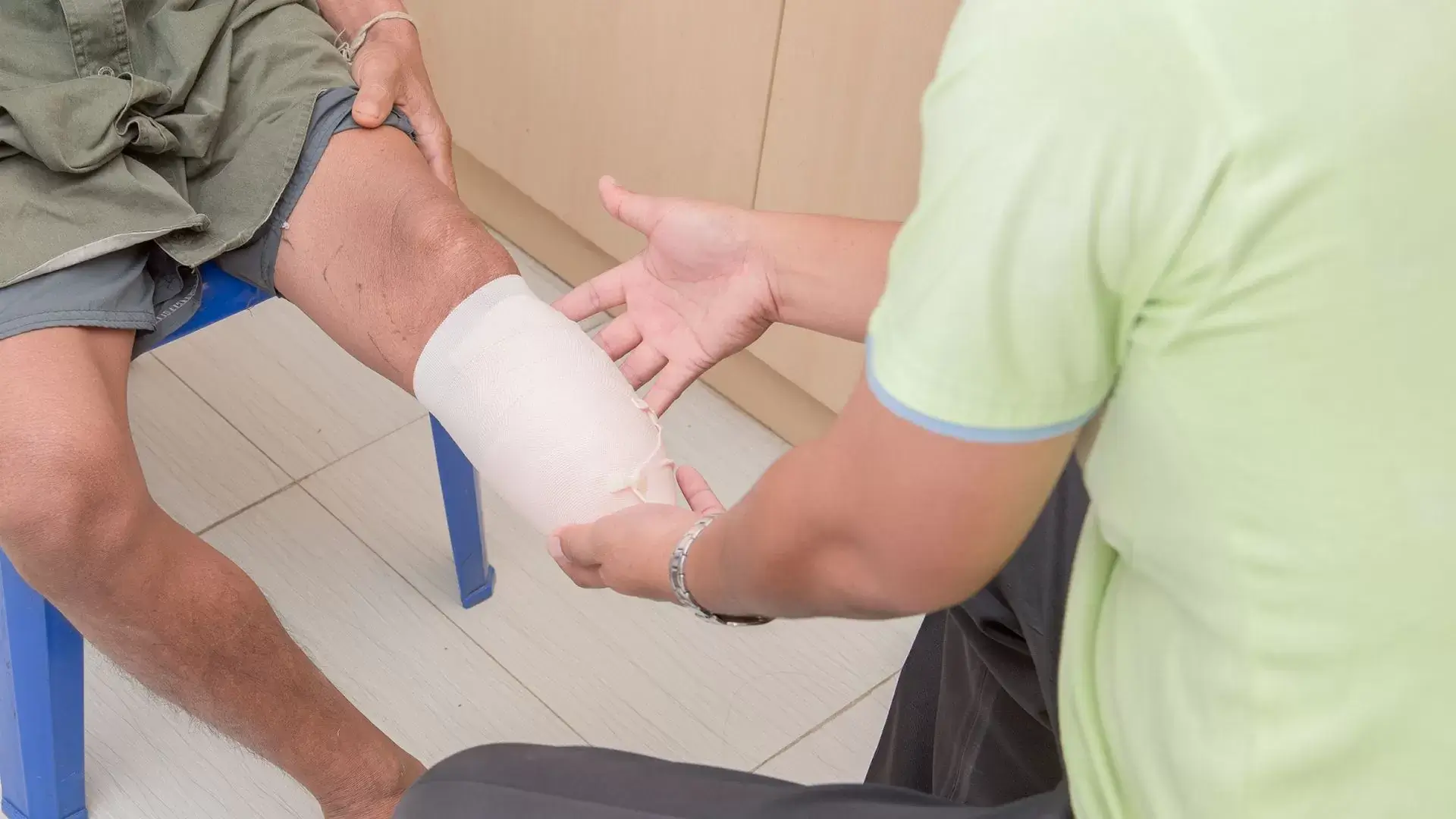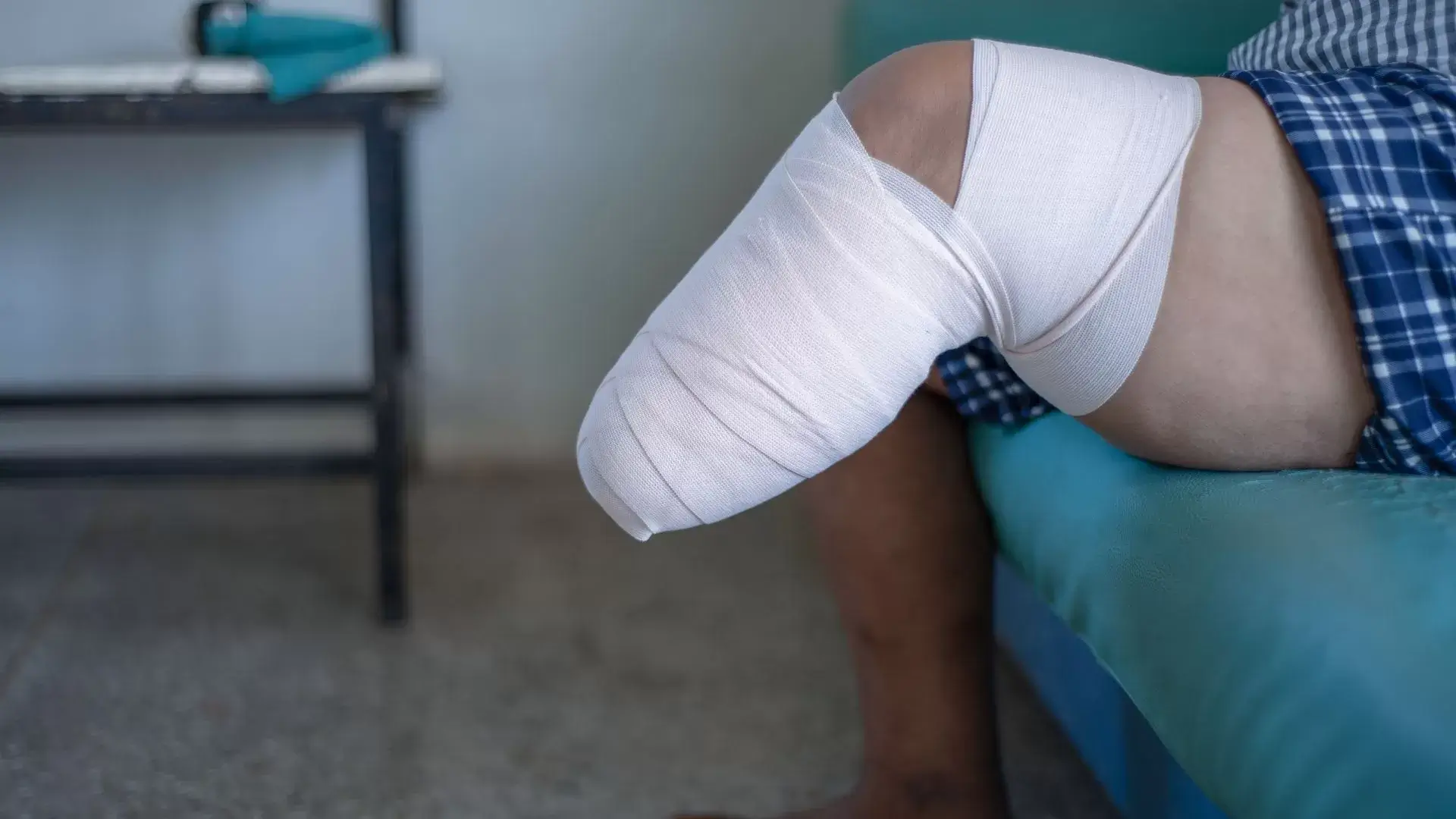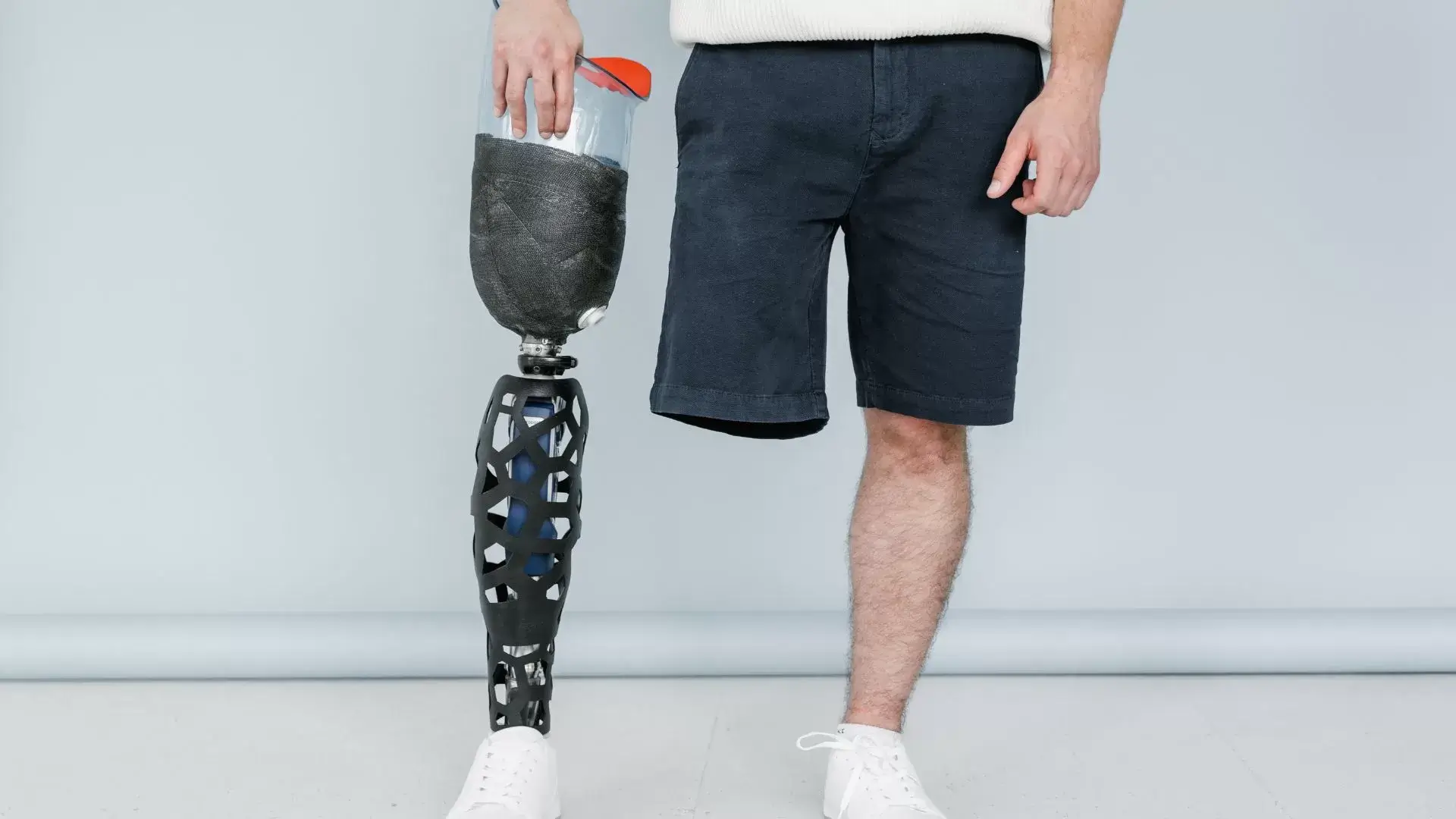In Mississauga, we provide specialized physiotherapy services for amputees, focusing on personalized rehabilitation that addresses both physical and emotional needs. Our programs include targeted gait training, strengthening exercises, and prosthetic adaptation, helping individuals regain mobility and confidence. Our Top Physiotherapy & Chiropractic Services in Mississauga recognizes the unique challenges faced during recovery, from managing phantom limb pain to improving balance. Our compassionate approach fosters emotional resilience and connects clients with support networks. With a commitment to helping amputees thrive, we’re dedicated to guiding you through every step of your recovery journey. There’s so much more to explore on how we can assist you effectively.

At Mississauga Physio Chiro Clinic, we offer extensive physiotherapy and chiropractic services tailored specifically to meet the unique needs of individuals recovering from amputations. Our focus is on thorough amputation recovery, guiding each patient through their journey with personalized care. We recognize that post-amputation care is vital for successful rehabilitation, and we emphasize both physical therapy for amputees and emotional support for amputees throughout the process.
Our dedicated team specializes in prosthetic rehabilitation, helping clients adapt to their new prosthetic devices effectively. We provide targeted gait training and post-amputation exercises that enhance mobility and strength, facilitating limb loss adaptation. Each program is designed to promote independence and confidence in daily activities.
We acknowledge that the road to recovery can be challenging, which is why our physiotherapy and chiropractic services include ongoing emotional support. We’re here to listen and address any concerns that may arise during rehabilitation. Together, we’ll work towards achieving your goals, ensuring you feel empowered and supported every step of the way. Let’s start this journey towards recovery and improved quality of life, tailored just for you.
How do amputations reshape daily life for individuals, affecting everything from mobility to emotional well-being? The journey of limb loss can bring significant challenges, including amputation complications that impact both physical and mental health. We often see how amputee mobility is altered, necessitating adaptations in daily activities.
Prosthetic fitting becomes a key element in restoring functional mobility, allowing individuals to engage in everyday tasks with greater ease. However, it’s not just about the physical aspect; emotional support through rehabilitation therapy is essential to address feelings of loss and identity. Many individuals experience phantom sensations, which can complicate the adjustment process.
Stump health is vital for ensuring comfort and functionality with prosthetics, making regular check-ups necessary. Adaptive devices can also play a significant role in enhancing independence, from modified kitchen tools to mobility aids. Additionally, occupational therapy for amputees helps individuals develop strategies to manage daily tasks effectively, promoting a sense of normalcy.
Together, we navigate these challenges, understanding that the impact of amputation extends beyond the physical domain, affecting the very fabric of daily life.
Physiotherapy plays an essential role in facilitating recovery after amputation, as it not only helps us regain mobility but also supports our emotional and physical well-being during this challenging change. After amputation surgery, our journey begins with effective post-surgical care, which includes managing phantom pain and addressing any limb weakness.
Through targeted exercises, we work on stump desensitization and residual limb care, preparing our bodies for the integration of a prosthetic. Prosthetic training becomes critical, as it teaches us how to use our new limb effectively. Proper prosthetic alignment is fundamental for comfort and functionality, and our physiotherapist guides us through this adjustment.
Additionally, we learn about adaptive equipment that can make daily tasks easier, promoting independence. Engaging with amputation support groups can also be beneficial, as they provide emotional support and shared experiences.
Ultimately, physiotherapy equips us with the tools to navigate our new reality, fostering resilience and a sense of normalcy. By investing in our rehabilitation, we’re not just recovering physically; we’re reclaiming our lives and enhancing our overall quality of life.
Caring for our residual limbs is essential in the early stages after amputation, as it directly impacts our recovery and ability to adapt to new challenges. Effective residual limb management is critical for minimizing stump pain and preventing complications like skin breakdown and limb swelling. We must focus on wound healing through regular cleaning and monitoring for any signs of infection.
Managing phantom limb pain is another important aspect of our care. Techniques such as mirror therapy and gentle massage can help alleviate this discomfort, making it easier for us to adjust. When it comes to prosthetic customization, ensuring a proper fit is key for prosthetic comfort and functionality. Regular adjustments and consultations with our physiotherapist can greatly enhance our experience with our prosthesis.
Additionally, we can’t overlook the importance of prosthetic maintenance. A well-maintained prosthetic not only improves our mobility but also plays a role in amputation prevention by reducing the risk of further complications. By staying proactive in our care and addressing any issues promptly, we can pave the way for a smoother recovery and a more fulfilling life post-amputation.

Customized rehabilitation plays an important role in our journey toward regaining independence and functionality after experiencing upper or lower limb loss. Through tailored programs, we can effectively address the unique challenges that arise from amputations. For those with upper limb amputation, we focus on optimizing the use of prosthetic limbs to enhance fine motor skills, while lower limb amputation rehabilitation centers on improving mobility and balance, integrating advanced prosthetic technology.
We’ll also explore the latest prosthetic advancements, making sure we’re aware of cutting-edge designs that can greatly improve our quality of life. Incorporating mobility aids into our daily routines is vital, as they provide additional support and confidence during our rehabilitation process.
As we progress, it’s important to take into account our interests, such as engaging in amputee sports, which can foster a sense of community and motivation. By addressing prosthetic wear and maintenance, we make certain our devices remain functional and comfortable. Together, we’ll navigate the journey of adapting to life with prosthetics, embracing the opportunities that come with personalized rehabilitation, and ultimately reclaiming our independence.
As we adapt to life with prosthetics, many of us may encounter phantom limb pain and sensory challenges that can complicate our rehabilitation journey. This discomfort often arises due to changes in our nervous system after an amputation, whether it’s an arm amputation or a below-knee amputation. Understanding these sensations is vital for effective management.
Prosthetic innovation has led to advanced prosthetics that not only enhance mobility but also address these issues. Techniques like stump wrapping can provide comfort and reduce phantom limb sensations, while bionic technology continues to evolve, offering greater integration with our body’s signals.
We must acknowledge that phantom limb pain is a common experience, and it’s important to communicate openly with our healthcare team about these challenges. They can recommend tailored strategies, including physical therapy, medication, and desensitization techniques, to help alleviate discomfort.
Finding the right fit for our prosthetic can greatly influence our comfort and mobility, making effective training essential for a successful rehabilitation journey. In physiotherapy, we focus on prosthetic limb adjustment to guarantee that our artificial limbs, whether for foot amputation, finger amputation, or above-knee amputation, are tailored to our unique needs. Proper fitting not only enhances comfort but also helps us avoid circulation issues that may arise from poorly fitted bionic limbs.
As we commence on this journey, we should prioritize effective training techniques that build strength and coordination. Our physiotherapists guide us through exercises that accommodate our specific challenges, particularly after trauma-related amputation. They emphasize the importance of gradual progression, helping us adapt to our new limbs and regain independence.
Additionally, we must remain engaged in the limb salvage process, where possible, to maximize function and minimize complications. By working closely with our healthcare team and committing to our rehabilitation plan, we can improve our overall quality of life and embrace the possibilities that our new prosthetics offer. Together, we can navigate this transformative experience with confidence and resilience.
Recent advancements in prosthetic technology are revolutionizing the way we approach mobility, offering us enhanced functionality and improved quality of life. For individuals facing traumatic amputation, surgical amputation, or complications from vascular disease and diabetes-related amputation, these innovations provide new hope.
Modern prosthetic devices are now equipped with smart technology that allows for real-time adjustments, enhancing mobility and adaptability to various terrains. For those recovering from limb trauma or hand amputation, this means greater independence and the ability to engage in daily activities with confidence.
Additionally, advancements in materials have led to lighter, more durable prostheses that reduce fatigue and improve comfort during rehabilitation. The integration of robotics and artificial intelligence in prosthetic technology enables more natural movements, making it easier for users to adapt.
As we embrace these innovations, we’re reminded of the importance of ongoing support and rehabilitation. It’s essential that we work together to guarantee that every individual has access to the latest technologies that facilitate their recovery and reintegration into daily life. By staying informed and advocating for advancements in prosthetic technology, we can greatly enhance the mobility and well-being of amputees.

Innovative prosthetic technologies play a pivotal role in rehabilitation, and understanding key physiotherapy techniques is essential for maximizing recovery and enhancing functional independence for amputees. At our clinic located at 1834 Lakeshore Rd W unit 6C, Mississauga, ON L5J 1J7, we tailor our approach to each individual’s needs, whether they’re recovering from a congenital amputation, cancer-related amputation, or infection-related amputation.
One fundamental technique we utilize is strengthening exercises, which help improve overall muscle function and stability. This is especially important for individuals who have undergone toe amputation or joint disarticulation. We also emphasize the importance of balance training, which aids in preventing falls and enhances mobility.
Additionally, we incorporate gait training, allowing amputees to adapt to their prosthetics effectively, ensuring they can navigate their environment confidently. Education plays a vital role too; we guide patients on proper care and use of their prosthetic devices.
Adjusting to life after an amputation requires a multifaceted approach, and occupational therapy plays an essential role in helping individuals regain their independence and adapt to new daily routines. We recognize that this change can be overwhelming, but occupational therapists are here to guide us through the process.
In our sessions, we focus on practical skills that enhance daily living, from personal care to household tasks. We’ll learn adaptive techniques and utilize assistive devices tailored to our specific needs. This personalized approach not only promotes physical recovery but also boosts our confidence in maneuvering everyday activities.
Moreover, occupational therapy emphasizes the importance of emotional well-being. We’ll engage in discussions that address the psychological aspects of adapting to our new circumstances. By fostering a supportive environment, we can share our experiences and learn from one another.
Ultimately, the goal of occupational therapy is to empower us to lead fulfilling lives post-amputation. Through collaboration with our therapists, we can develop strategies that enable us to embrace our new reality, making it possible to thrive in our environment and reclaim our independence. Together, we’re capable of overcoming these challenges.
Steering through the complications that can arise after an amputation is a critical aspect of our recovery journey, and understanding these challenges helps us take proactive steps toward overcoming them. Common issues include phantom limb pain, which can be distressing and unpredictable. We need to recognize that this sensation is real and can often be managed through various therapies, including medications and mindfulness techniques.
Another complication we may face is skin irritation or breakdown at the amputation site, particularly if we’re adjusting to a prosthetic limb. Regular monitoring and proper hygiene are essential, and our physiotherapists can guide us in maintaining skin integrity.
Additionally, we might experience fluctuations in mobility due to physical weakness or changes in balance. Engaging in a structured physiotherapy program will help us strengthen our remaining limbs and improve overall stability.
Lastly, emotional wellbeing is an often-overlooked aspect of recovery. It’s important to communicate our feelings and seek support from professionals or support groups. By addressing these complications head-on, we can foster resilience and enhance our overall quality of life during this challenging time.
Engaging in adaptive sports and recreational activities can greatly enhance our physical and emotional wellbeing after an amputation, promoting both fitness and social connections. These activities not only help us maintain our physical health but also provide a sense of community and belonging.
Adaptive sports, such as wheelchair basketball, hand cycling, or swimming, allow us to stay active while adapting to our new circumstances. Participating in these sports improves our strength, endurance, and balance, which are essential for daily functioning. Furthermore, the camaraderie we experience with fellow athletes fosters a supportive environment that can be incredibly uplifting.
Recreational activities, like hiking or yoga, can also be tailored to accommodate our unique needs. They offer opportunities for relaxation, stress relief, and mindfulness, contributing to our overall mental health. By exploring these adaptive options, we can rediscover our interests and passions, leading to a more fulfilling life.
Ultimately, embracing adaptive sports and recreational activities empowers us to reclaim control over our bodies and lives, encouraging resilience and a positive outlook. Let’s take the plunge into new experiences and enjoy the journey together.
Providing emotional support and connecting with amputee groups can greatly enhance our coping strategies, fostering a sense of belonging and understanding in our shared experiences. These connections allow us to share our challenges and triumphs, which can be incredibly validating. We’re not alone in our journey; many others have faced similar obstacles and can offer valuable insights.
Joining support groups, whether in-person or online, enables us to discuss our feelings openly and receive encouragement from those who truly understand. Hearing stories of resilience can inspire us to find our strength and adapt positively to our new circumstances.
Additionally, engaging with amputee groups can provide practical advice on maneuvering everyday life, from prosthetic options to managing physical challenges. We can learn about resources available in our community, including workshops and social events that promote both physical and emotional well-being.
Ultimately, by connecting with others who share our experiences, we cultivate a network of support that empowers us. We can embrace our identities as amputees with confidence and hope, knowing we have a community that stands with us. Together, we can foster healing and resilience in the face of adversity.
While connecting with others living with limb loss offers invaluable emotional support, specialized rehabilitation for trauma- and disease-related limb loss is equally important in helping us regain function and independence. This type of rehabilitation focuses on tailored therapies that address our unique needs, whether our limb loss is due to an accident or a medical condition like diabetes or cancer.
In our rehabilitation journey, we work closely with experienced physiotherapists who assess our individual circumstances and create customized plans. These plans often include strength training, balance exercises, and gait training, aimed at improving mobility and overall physical function. Additionally, we might engage in activities that enhance coordination and proprioception, which are vital for daily tasks.
Moreover, incorporating prosthetic training into our rehabilitation can greatly impact our ability to adapt to our new reality. Through hands-on practice and guidance, we learn how to use our prosthetics effectively, enabling us to participate fully in life again.
To maintain our long-term health after an amputation, it’s essential to focus on preventative care strategies that support our overall well-being and functional independence. One of the most important aspects of this care involves regular check-ups with our healthcare providers to monitor our physical and emotional health. By staying proactive, we can identify potential complications early and develop tailored plans to address them.
Additionally, engaging in a consistent exercise routine is fundamental. This not only helps us regain strength and mobility but also reduces the risk of secondary health issues, such as joint pain or cardiovascular disease. Incorporating activities like swimming, walking, or cycling can greatly enhance our physical fitness.
We should also prioritize proper nutrition. A balanced diet rich in vitamins and minerals supports healing and boosts our immune system, making it easier for us to adapt to our new way of life. Finally, mental health support—whether through counseling, support groups, or community resources—plays a critical role in our emotional resilience. By embracing these preventative strategies, we can foster a healthier, more fulfilling life post-amputation.
If you’re seeking extensive physiotherapy tailored specifically for amputees in Mississauga, we’re here to help you regain your strength and independence on your path to recovery. Our dedicated team understands the unique challenges faced by amputees and is committed to providing personalized care that addresses your specific needs.
We believe in a holistic approach to rehabilitation. By combining manual therapy, strength training, and gait analysis, we focus on enhancing your mobility and overall well-being. Our experienced physiotherapists will work closely with you to develop a customized treatment plan that aligns with your goals, whether it’s returning to daily activities or pursuing new hobbies.
We’re also here to support you emotionally, recognizing that the road to recovery can be overwhelming. Our compassionate team fosters an environment where you feel understood, valued, and encouraged every step of the way.
If you’re ready to start this journey with us, don’t hesitate to reach out. Together, we can create a path that leads to a fulfilling and active life post-amputation. Contact us today to schedule your consultation and take the first step towards reclaiming your life.
As we support amputees in their recovery journey, it’s important to recognize that Mississauga is a vibrant city rich in resources and opportunities for residents to thrive. Known for its diverse population, Mississauga offers a welcoming environment where everyone can find community support, including those who are maneuvering life after amputation.
The city boasts state-of-the-art healthcare facilities and numerous physiotherapy clinics specializing in rehabilitation for amputees. With access to skilled professionals and tailored programs, residents can engage in extensive rehabilitation services designed to enhance mobility and overall well-being.
Additionally, Mississauga features various recreational facilities, parks, and community centers that promote active lifestyles. These spaces not only encourage physical activity but also foster social connections, which are vital for emotional healing.
As we traverse this journey together, we appreciate how Mississauga’s commitment to inclusivity and accessibility empowers amputees to reclaim their independence. By leveraging the resources available within our city, we can create a supportive network that enhances the recovery process, helping individuals embrace their new lives with confidence and resilience.

When we’re seeking a physiotherapist for amputee care, we should prioritize qualifications that include specialized training in amputee rehabilitation and experience working with similar cases. It’s also important they have a solid understanding of prosthetics and customized therapy plans. We can look for credentials from recognized organizations and positive patient testimonials. Ultimately, their ability to demonstrate empathy and effective communication will enhance our rehabilitation journey, making us feel supported and understood.
Rehabilitation after an amputation typically varies based on individual circumstances, but it usually takes several weeks to months. We’ll often find that factors like overall health, the level of amputation, and personal goals play significant roles in this timeline. It’s essential for us to stay patient and committed during this process, as progress can be gradual. With the right support and guidance, we can effectively navigate our recovery journey together.
When it comes to improving balance in amputees, there are various specific exercises we can focus on. These might include single-leg stands, heel-to-toe walks, and using balance boards. Incorporating strength training for the core and legs is essential, too. We’ll also emphasize functional movements that mimic daily activities, helping to enhance stability. It’s important for us to tailor these exercises to each individual’s needs and progress to guarantee safety and effectiveness.
Supporting amputees during recovery involves understanding their needs and being present. We can listen to their feelings, encourage them to express frustrations, and celebrate small victories together. It’s crucial to assist with mobility and daily activities, fostering independence while also offering a helping hand. We should also educate ourselves about their specific challenges and encourage participation in rehabilitation programs. Our empathy and patience can greatly impact their recovery journey.
When considering financial aid options for physiotherapy after amputation, we’ve found several avenues to explore. Many insurance plans cover a portion of rehabilitation costs, so it’s important to check our policy details. Additionally, government programs and non-profit organizations may offer grants or subsidies. We should also look into community resources and local support groups, as they often provide valuable information about available financial assistance tailored to our needs.
Reach out to us today to book an appointment or learn more about our services. Our friendly team is here to answer your questions and help you take the first step toward improved health and wellness.
(647) 372-1209

At our “Mississauga Physio Chiro Clinic”, we are dedicated to providing personalized care that addresses the root cause of your discomfort. With a team of experienced physiotherapists and chiropractors, we focus on restoring your mobility, relieving pain, and enhancing your overall well-being.